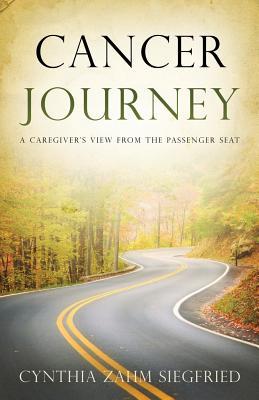On the day my husband, Jim, was diagnosed with cancer, we began a journey that changed us forever. I was just a passenger, along for the ride, but I was profoundly affected by the illness. Jim frequently said he believed cancer is harder on the caregiver than the patient; I don't believe that for a minute. One thing, though, is certain: the view from the passenger seat is....different.
During our trip, I learned that being caregiver to a seriously ill person has problems different from, but equally as serious as, those of the patient. Like many thrust into this position, I was ill-equipped to handle the job. For help I turned to God, who "showed me great and mighty things, which I had not known before" (Jeremiah 33:3).
After recovering from the initial shock of the diagnosis, I determined to help my husband fight the disease. I hoped that through diligent research we could learn which treatments, tools, and tricks might put him in the ten percent who survived this kind of cancer for five years. I became a woman with a mission. But I soon realized this missionary needed help.
My real burden as a caregiver was the emotional stress not the physical. A cancer diagnosis is followed by a psychological and spiritual crisis as we move through the stages of grief toward acceptance. Before I could accept the possibility of my husband's death, I had to answer the basic question "Why are we here and where are we going?" Once I had done that I was able to rest on God's promises and find hope in the midst of a grim prognosis.
When I relinquished all illusions of control and depended on God for my strength and wisdom my burden was lightened. I actually experienced moments of humor and joy on what would otherwise have been a dismal, terrifying trip. I found my place was not in the driver's seat but in the passenger seat offering support to my husband, as God lovingly chauffeured us over the peaks and through the valleys. True to His Word, He made "a way in the wilderness and streams in the desert" (Isaiah 43:19).
On the journey I learned more about the character of God. He helped me develop an attitude of thankfulness. As He met our every need, spiritual and emotional, I learned how the "Law of the Harvest" works. He showed me how to share my experiences with others to bring glory to Him. When I responded in obedience, the floodgates of heaven opened and He showered me with abundant blessings in the middle of a life crisis.
As I moved through the stages of grief, God held me in His hand. I have never felt closer to Him than during that time. When I handed the steering wheel over to God, He guided me through each stage of the journey and left me with the roadmap I share in this story.

Cancer Journey: A Caregiver's View from the Passenger Seat
On the day my husband, Jim, was diagnosed with cancer, we began a journey that changed us forever. I was just a passenger, along for the ride, but I was profoundly affected by the illness. Jim frequently said he believed cancer is harder on the caregiver than the patient; I don't believe that for a minute. One thing, though, is certain: the view from the passenger seat is....different.
During our trip, I learned that being caregiver to a seriously ill person has problems different from, but equally as serious as, those of the patient. Like many thrust into this position, I was ill-equipped to handle the job. For help I turned to God, who "showed me great and mighty things, which I had not known before" (Jeremiah 33:3).
After recovering from the initial shock of the diagnosis, I determined to help my husband fight the disease. I hoped that through diligent research we could learn which treatments, tools, and tricks might put him in the ten percent who survived this kind of cancer for five years. I became a woman with a mission. But I soon realized this missionary needed help.
My real burden as a caregiver was the emotional stress not the physical. A cancer diagnosis is followed by a psychological and spiritual crisis as we move through the stages of grief toward acceptance. Before I could accept the possibility of my husband's death, I had to answer the basic question "Why are we here and where are we going?" Once I had done that I was able to rest on God's promises and find hope in the midst of a grim prognosis.
When I relinquished all illusions of control and depended on God for my strength and wisdom my burden was lightened. I actually experienced moments of humor and joy on what would otherwise have been a dismal, terrifying trip. I found my place was not in the driver's seat but in the passenger seat offering support to my husband, as God lovingly chauffeured us over the peaks and through the valleys. True to His Word, He made "a way in the wilderness and streams in the desert" (Isaiah 43:19).
On the journey I learned more about the character of God. He helped me develop an attitude of thankfulness. As He met our every need, spiritual and emotional, I learned how the "Law of the Harvest" works. He showed me how to share my experiences with others to bring glory to Him. When I responded in obedience, the floodgates of heaven opened and He showered me with abundant blessings in the middle of a life crisis.
As I moved through the stages of grief, God held me in His hand. I have never felt closer to Him than during that time. When I handed the steering wheel over to God, He guided me through each stage of the journey and left me with the roadmap I share in this story.